How Echo Fox built a League of Legends team to defy all expectations
“Are you a good person?”
This is Jared Jeffries’ litmus test. Not whether you’re good at League of Legends or any of the other games in Echo Fox’s esports portfolio. For the former NBA player and onetime-Player Personnel Director, character comes first, talent second. This is how he’s finding pro gamers and it’s how he’s setting the tone for his teams.
So far, it seems to be paying off. For the very first time in history, Echo Fox’s League of Legends LCS team is winning—a lot. Heading into week five, they’re at 7-1 and tied for first. Most importantly, they’ve prevailed in tough matches, proving their new roster can close out more than just surefire wins.
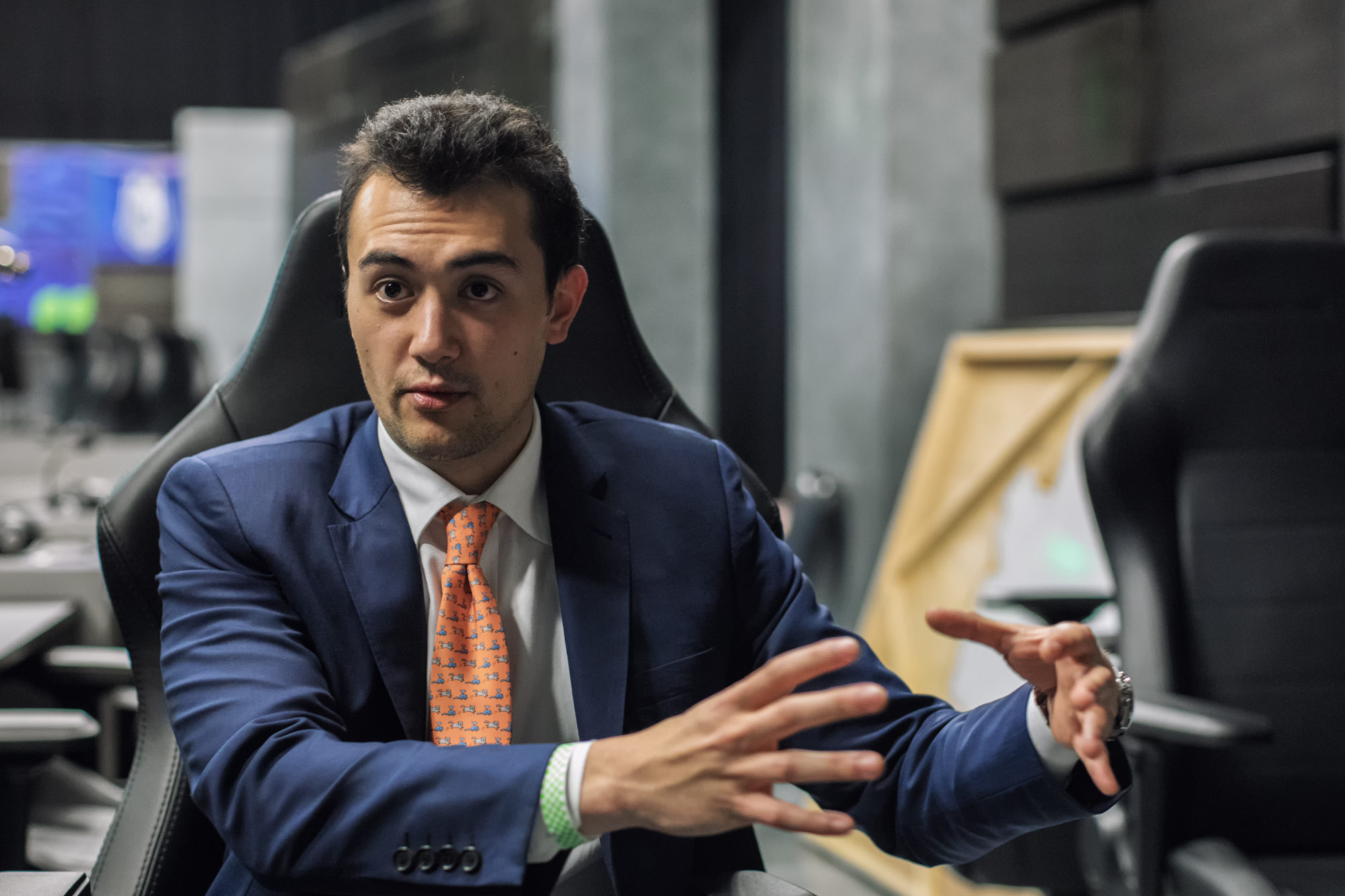 Jake Fyfe’s years of esports experience have given him a sixth sense for team issues and finding the best players and management.
Jake Fyfe’s years of esports experience have given him a sixth sense for team issues and finding the best players and management.
If you asked General Manager Jake Fyfe about Echo Fox’s momentum, he’d probably grin crookedly before saying he told you so. Pervasive community rumors have followed Echo Fox’s new roster, with some people saying they might cave to mental pressure or tilt after a loss or two.
Fyfe knows better than that. He’s played dozens of games competitively since he was 12 years old. Competitive gaming runs in his family and he’s worked in esports practically his whole life. He has an uncanny sixth sense for how players interact, not to mention an incredible knack for recruiting. So, when he says he has confidence in Echo Fox’s organization from top to bottom, you’d better believe it.
It starts at the top

Rick Fox and his front office team show off their #BlobSquad spirit by waving cutouts of Adrian, Fenix, and Altec’s heads during NA LCS week three. (Via <@EchoFoxGG on Twitter.)
For Echo Fox, building a winning team begins with management. “The passion of everyone involved [...] really starts at the top with Rick and Jared,” says Director of Player Operations, Daniel Deshe. After Echo Fox won their first game, Jeffries called Deshe and was practically bouncing off the walls with excitement.
Deshe says that team owner Rick Fox is in the office almost daily, and when the team was founded, Fox was burning the midnight oil right along with his players. “He didn’t have a coaching staff,” adds Deshe. “He was the one doing it.” These days, Fox often pops in unexpectedly to take teams out to dinner, or simply checks in to ask how they’re feeling. Players like that Fox is around so often. On other teams, the owner is just a guy sitting in an office writing checks from time to time. It’s clear that Rick Fox actually cares. In fact, he’s become an avid League of Legends player and recently created a YouTube channel where he streams games with his son Kyle.
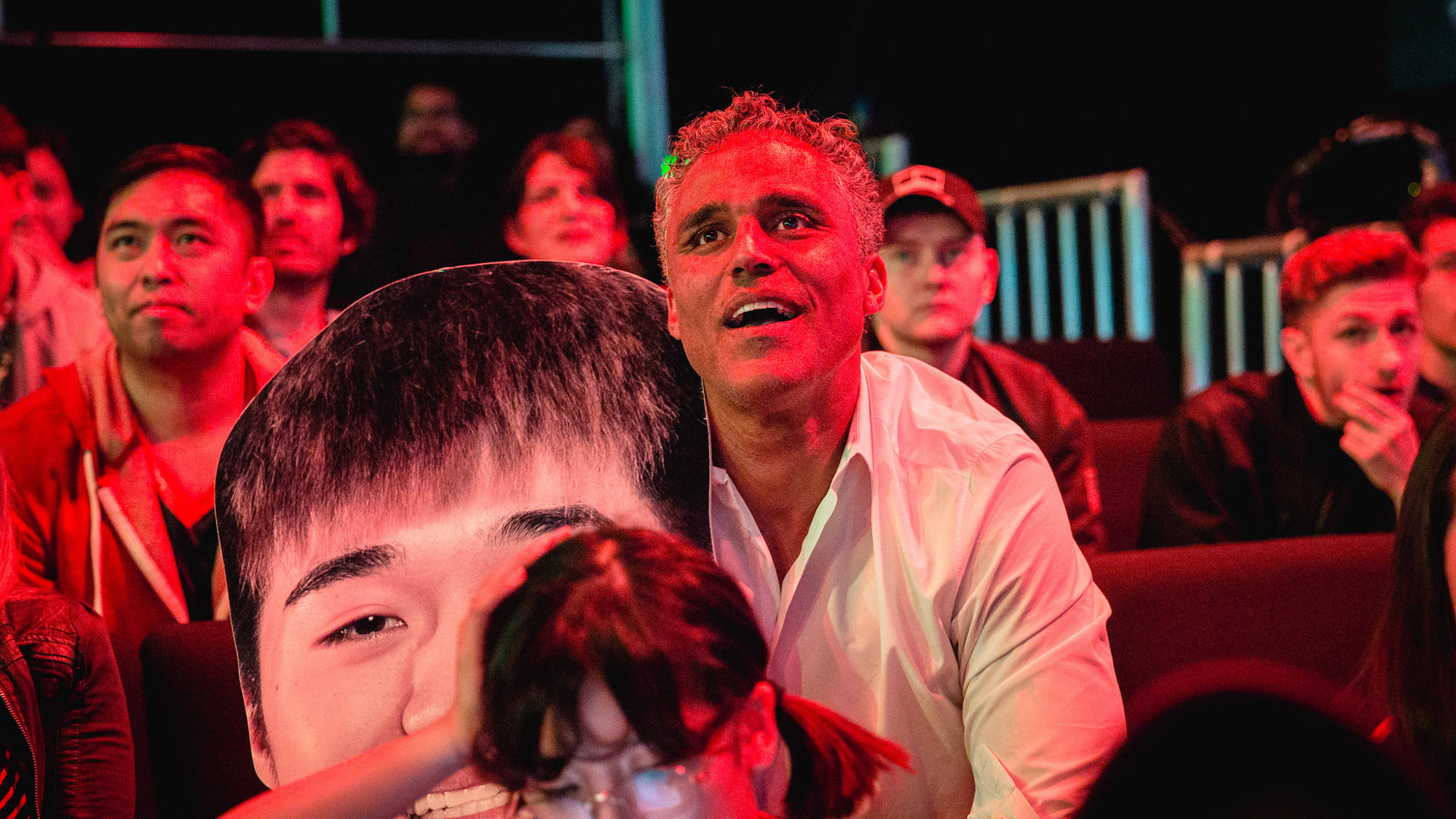 Everyone agrees that Rick Fox is more involved with his team than the typical owner. (Photo via @lolesports on Flickr.)
Everyone agrees that Rick Fox is more involved with his team than the typical owner. (Photo via @lolesports on Flickr.)
These days, Rick Fox has moved on from coaching, but Echo Fox’s players have plenty of help. GM, Jake Fyfe puts huge emphasis on recruiting a rock-solid leadership team, and players only have glowing things to say about their coaches. “Playing with all these great individual players and support staff, I feel like I'm actually improving every day,” says Adrian ‘Adrian’ Ma. He finds that the daily constructive criticism and communication from coaches and players is immensely helpful.
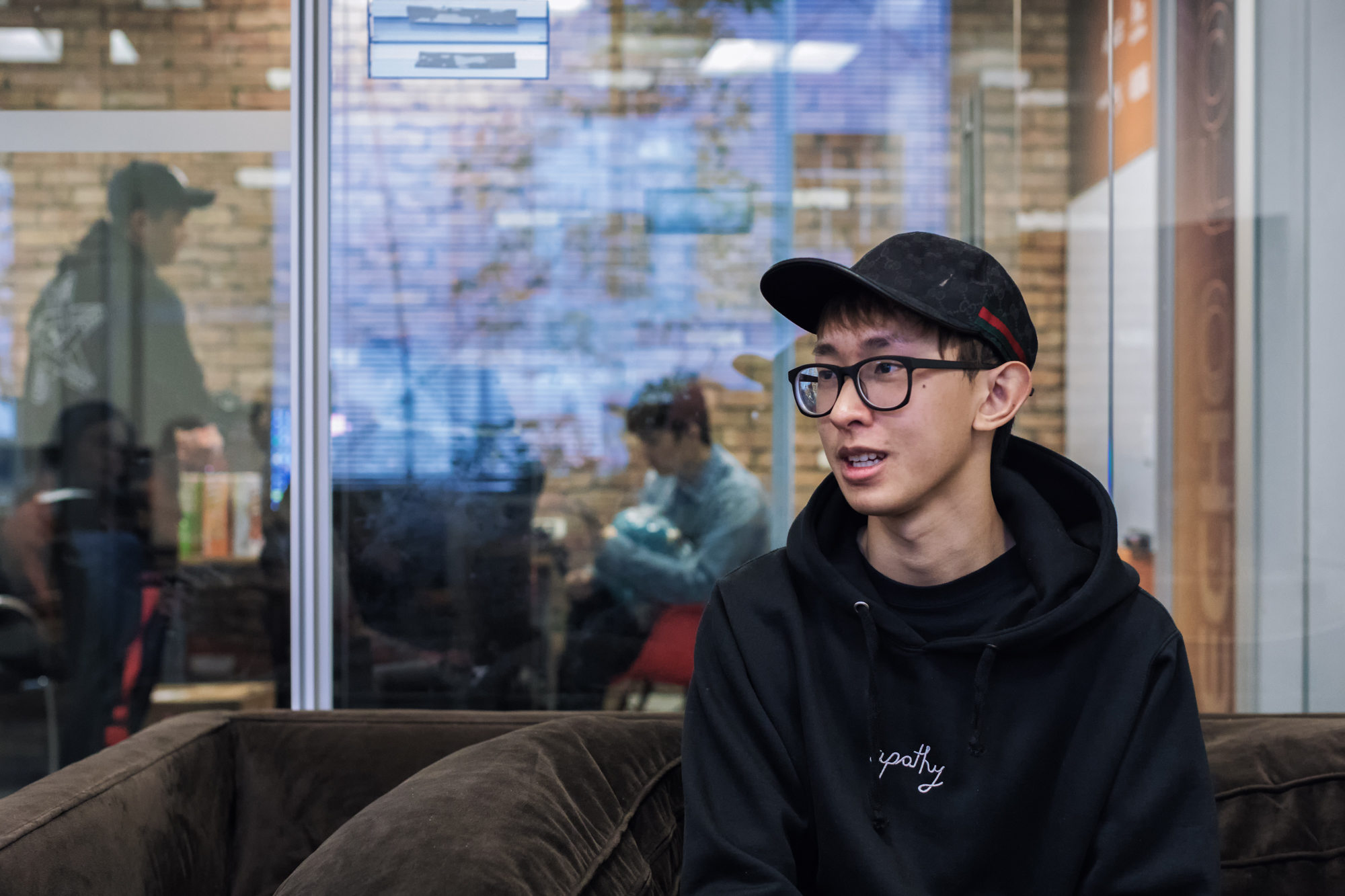 Even though he’s been with Echo Fox for just two months, Adrian says he’s noticeably grown as a player.
Even though he’s been with Echo Fox for just two months, Adrian says he’s noticeably grown as a player.
Other LCS players love Coach Inero’s ability to focus on the big picture. “Inero is really smart with the game,” says Adrian. Unlike many coaches, Inero isn’t hyperfocused on individual mistakes or small mechanical errors, but the greater team context. Josh ‘Dardoch’ Hartnett elaborated that Inero strikes a perfect balance, managing to be hands-on without micromanaging players.
From talking to Inero, it’s clear why his players speak so highly of him. He’s not only passionate about his job, but he genuinely doesn’t want to let players down. Walking the line between authority and friendship is difficult, even for the most experienced managers. Nonetheless, he wants his team to feel like he’s both a professional and personal support system. “I want to be someone that they can both connect with and respect at the same time,” Inero says. So far, so good. His players admire him for his hardcore escape room skills as much as his LoL knowledge, and he’s even offered relationship advice during tough times.
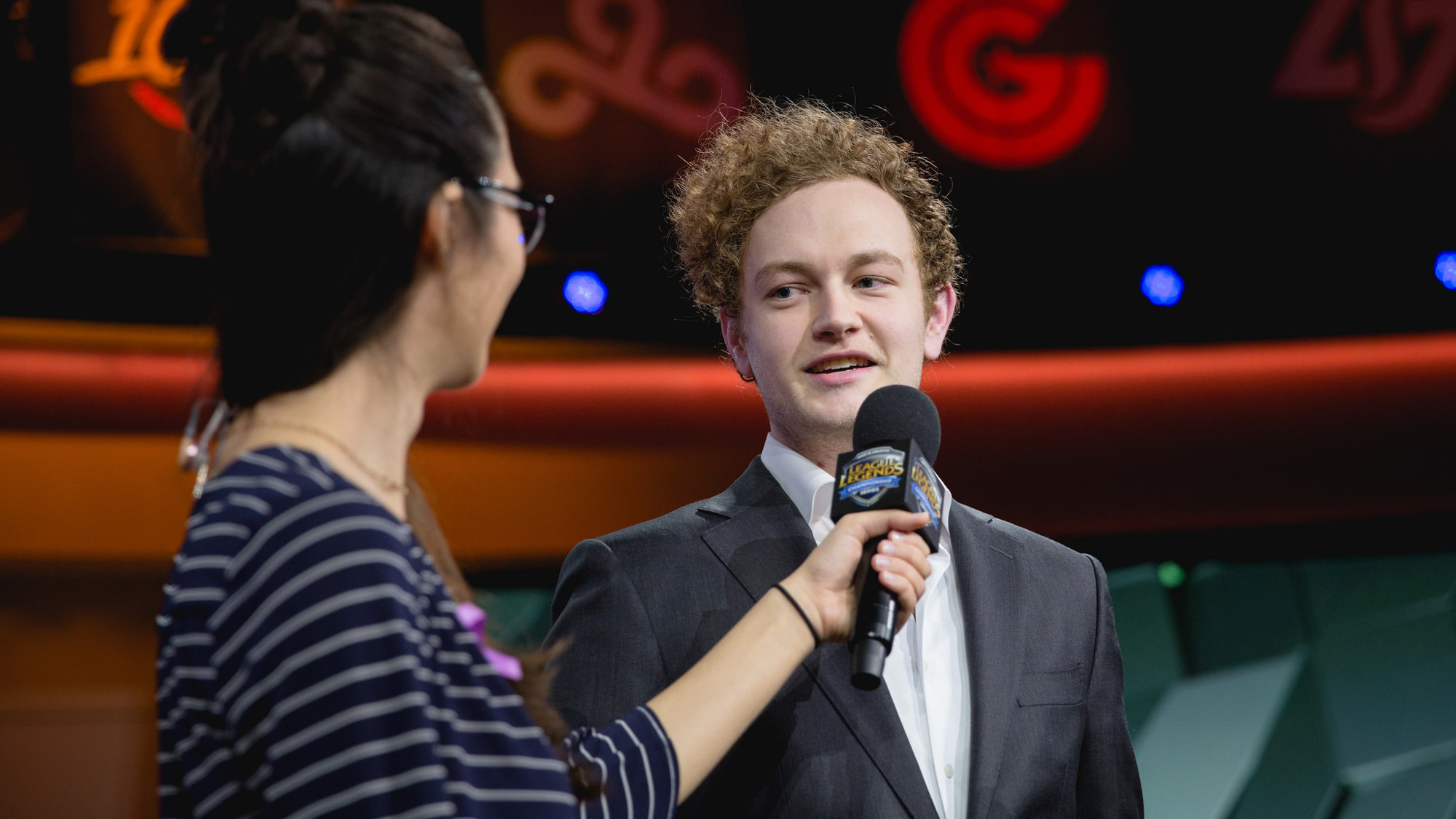 LCS Coach Inero may look serious onstage… (Photo via @lolesports on Flickr.)
LCS Coach Inero may look serious onstage… (Photo via @lolesports on Flickr.)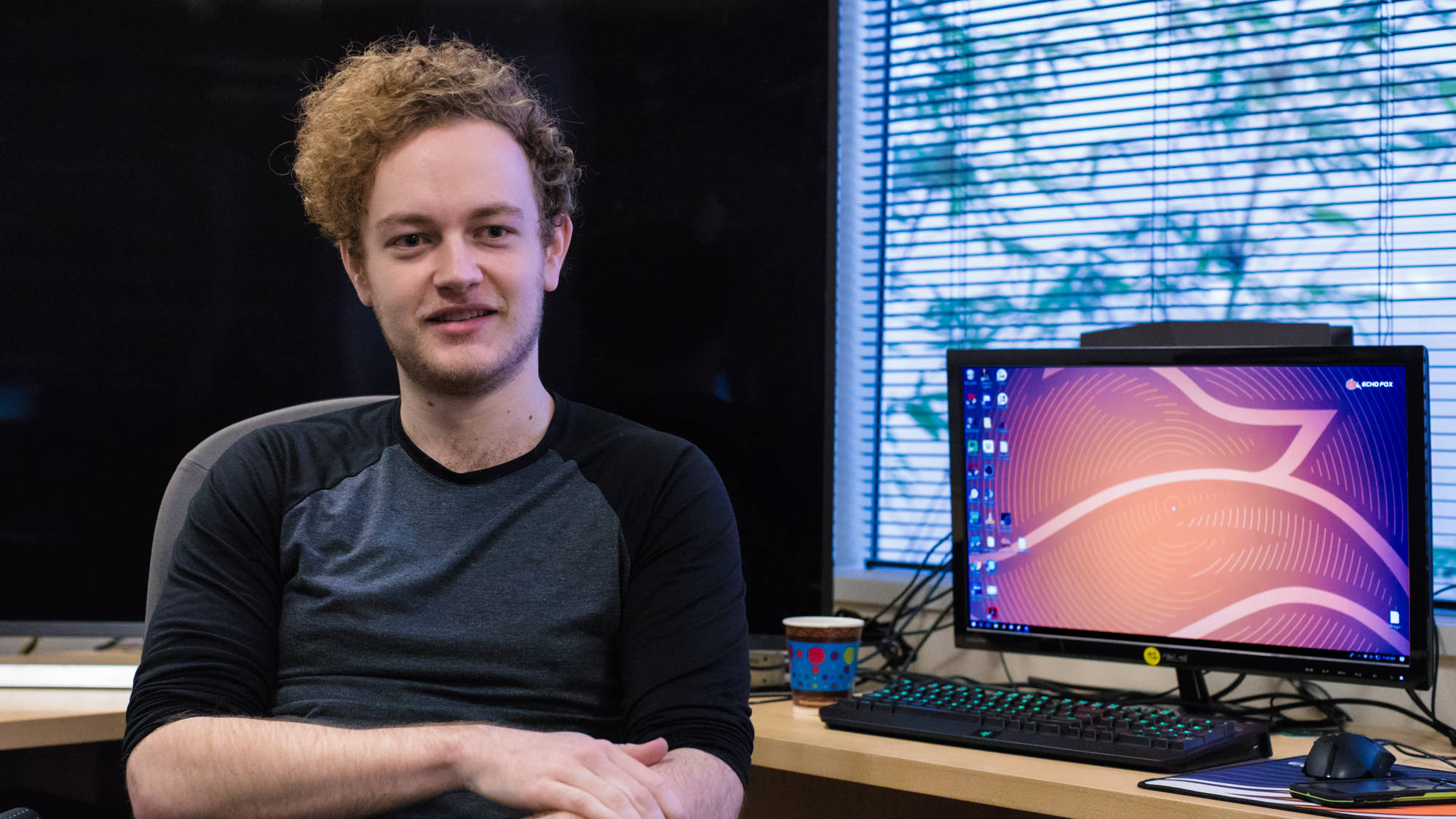 ...but his genuine passion shines through when he talks about his team.
...but his genuine passion shines through when he talks about his team.
This admiration is consistent across the board for all of the Echo Fox coaches, from Thomas ‘Thinkcard’ Slotkin, Echo Fox’s Strategic Coach, to Academy Coach Peter ‘Peter’ Zhang. GM Jake Fyfe sang Peter's praises in an interview: “Peter Zhang has been crushing [it] on Academy,” Fyfe said. “He's already 2-0. He won coach of the year at one point in his career on LCS.
That one is no surprise; Coach Peter’s review sessions are intensive. They feel like an actual League of Legends Academy, as he furiously scribbles detailed strategies on a whiteboard and holds up a laminated map of Summoner’s Rift, jabbing it to emphasize his points with a good-natured grin. Like all of the coaching staff, “he inspires us to not let him down and play really well,” says Academy Jungler Nathan ‘OddOrange’ Ryan. From top to bottom, ownership to coaches, the entire Echo Fox leadership team sets the tone for the organization, and the message they send is that they truly, deeply care about their players.
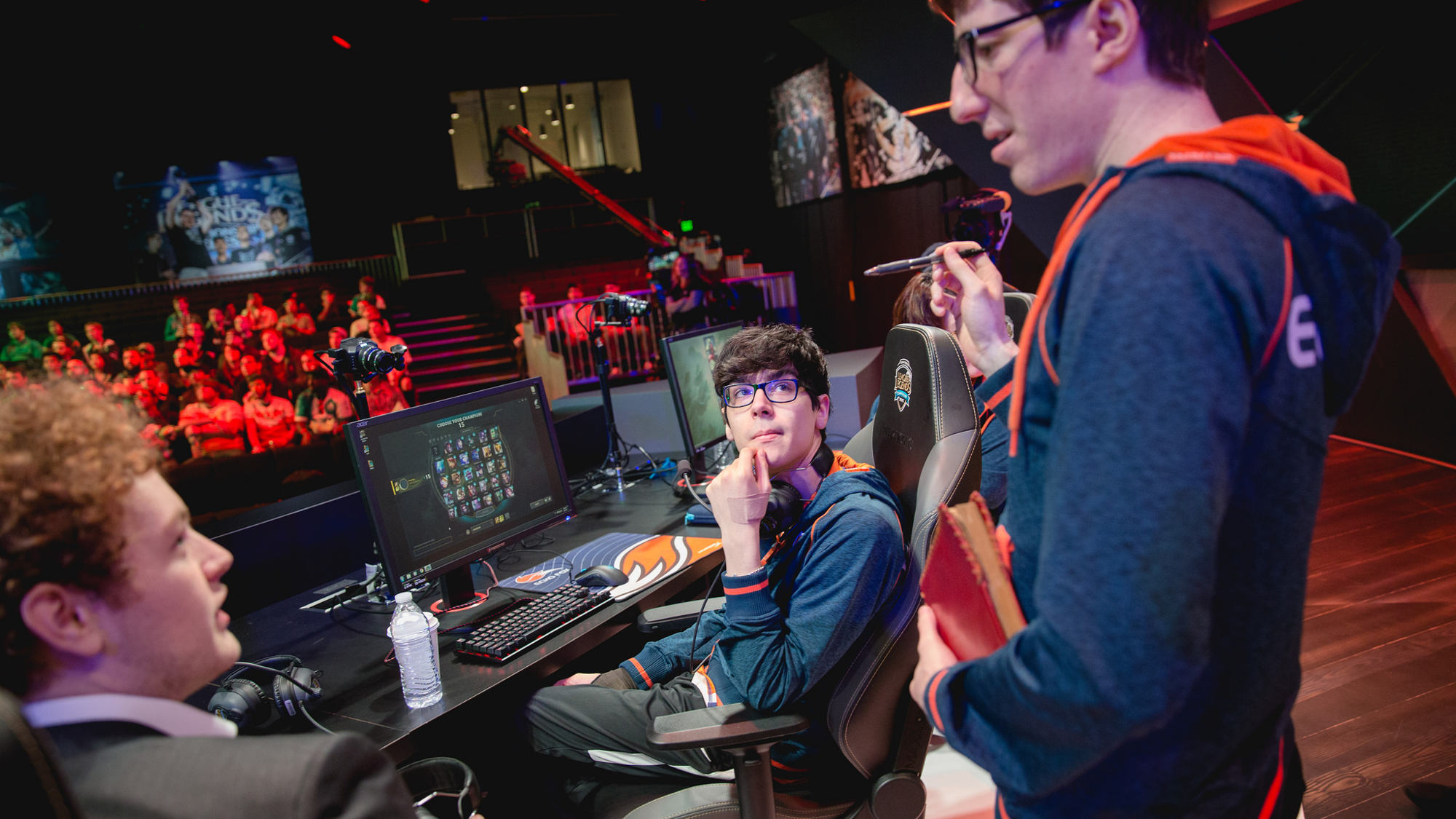 LCS Coach Inero (left), Jungler Dardoch (center), and Strategic Coach Thinkcard (right) huddle up before the week three game. (Photo via @lolesports on Flickr.)
LCS Coach Inero (left), Jungler Dardoch (center), and Strategic Coach Thinkcard (right) huddle up before the week three game. (Photo via @lolesports on Flickr.)
A weird, chaotic balance
Building a strong management team is one thing. Finding a winning combination of players is another. Many teams just focus on power rankings, but Echo Fox digs deeper than that. They believe getting the best players goes back to the basics: are you a good person? What’s your character? Are you capable of growth?
These fundamental questions can be traced to both Fyfe and Jeffries, who put their heads together during 2017 Free Agency. By applying intensive NBA recruiting methods and building an extensive player database, they managed to assemble a veritable dream team. Most importantly, they looked at the people behind the points.
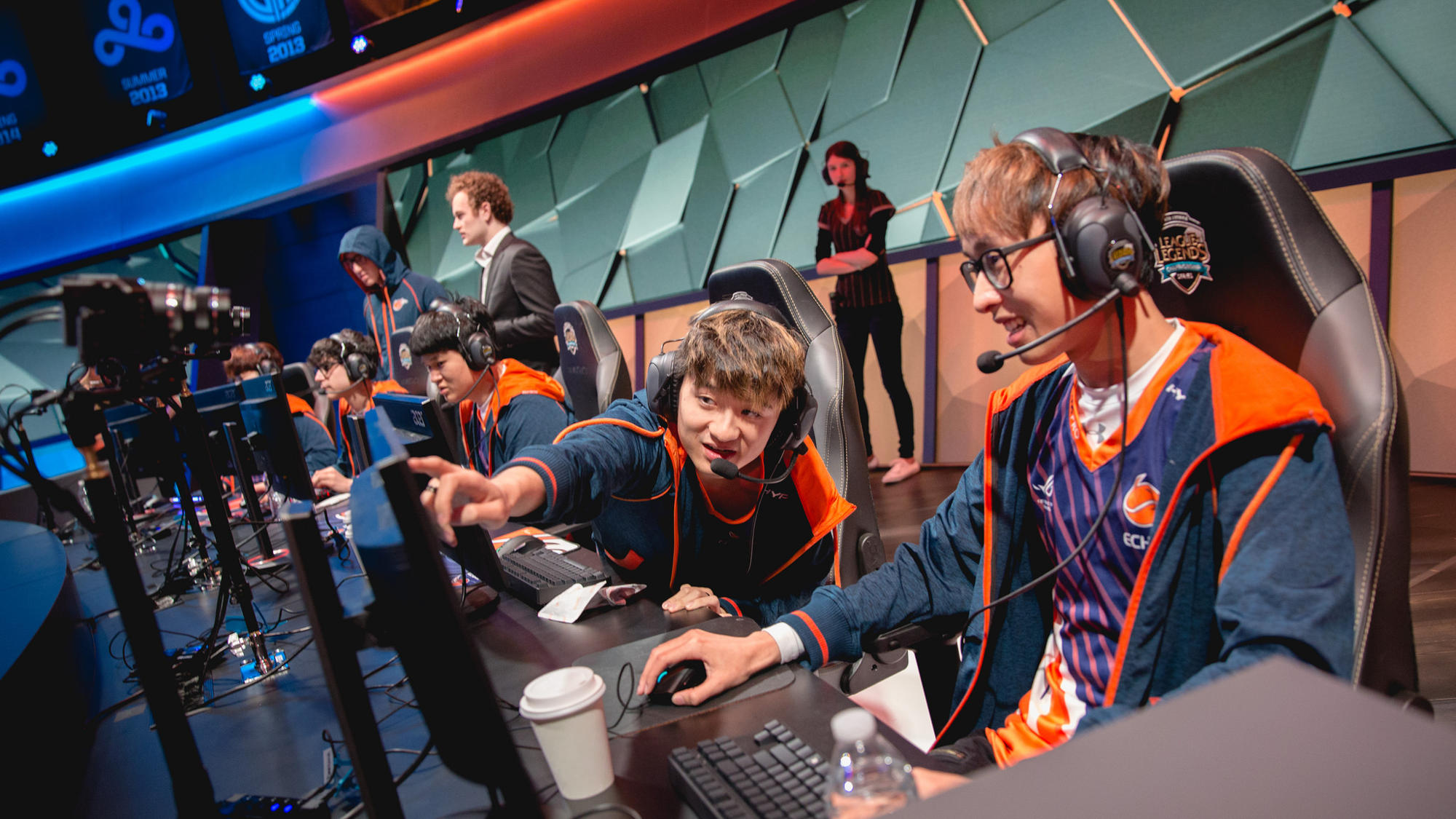 Altec and Adrian went into Free Agency 2017 as a unit. (Photo via @lolesports on Flickr.)
Altec and Adrian went into Free Agency 2017 as a unit. (Photo via @lolesports on Flickr.)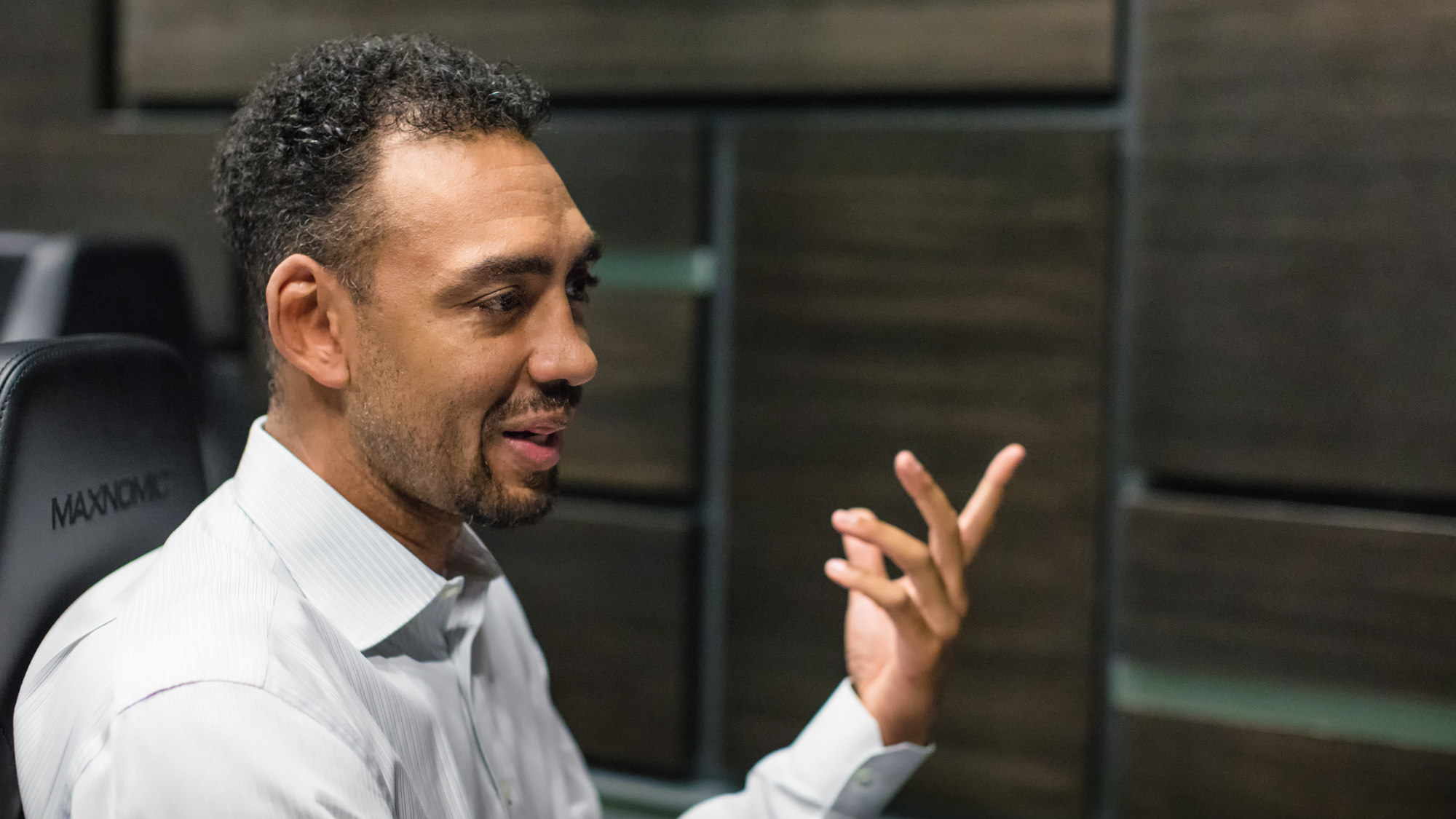 Jared Jeffries’ genuine empathy impressed Altec and Adrian the most.
Jared Jeffries’ genuine empathy impressed Altec and Adrian the most.
Thanks to these methods, the team landed pals Johnny ‘Altec’ Ru and Adrian ‘Adrian’ Ma, who went into Free Agency insisting they’d be recruited as a pair or not at all. It was immediately clear to Altec and Adrian that there was something very different about Echo Fox. “When we talked to Jared, he was the best,” says Adrian. “He actually cared about us. For other organizations, we didn't get that connection with them.” He doesn’t elaborate, though the conclusion seems clear: other teams viewed them as statistics, while Echo Fox valued them as people.
Echo Fox also recruited the last player anyone thought would join the team, Heo ‘Huni’ Seung-hoon, a world-renowned South Korean top laner whose bubbly personality and aggressive playstyle have cemented his place on the new roster.
Even when they weren’t doing well, Rick Fox’s team was one Huni always cheered for. When it was time for his big return to North America, Huni’s choice was surprisingly simple. The Echo Fox staff are kind. He knew and liked the team owner. They have a real front office for player training. And, perhaps most importantly, former Immortals support player Adrian was on the roster. They could finally be reunited.
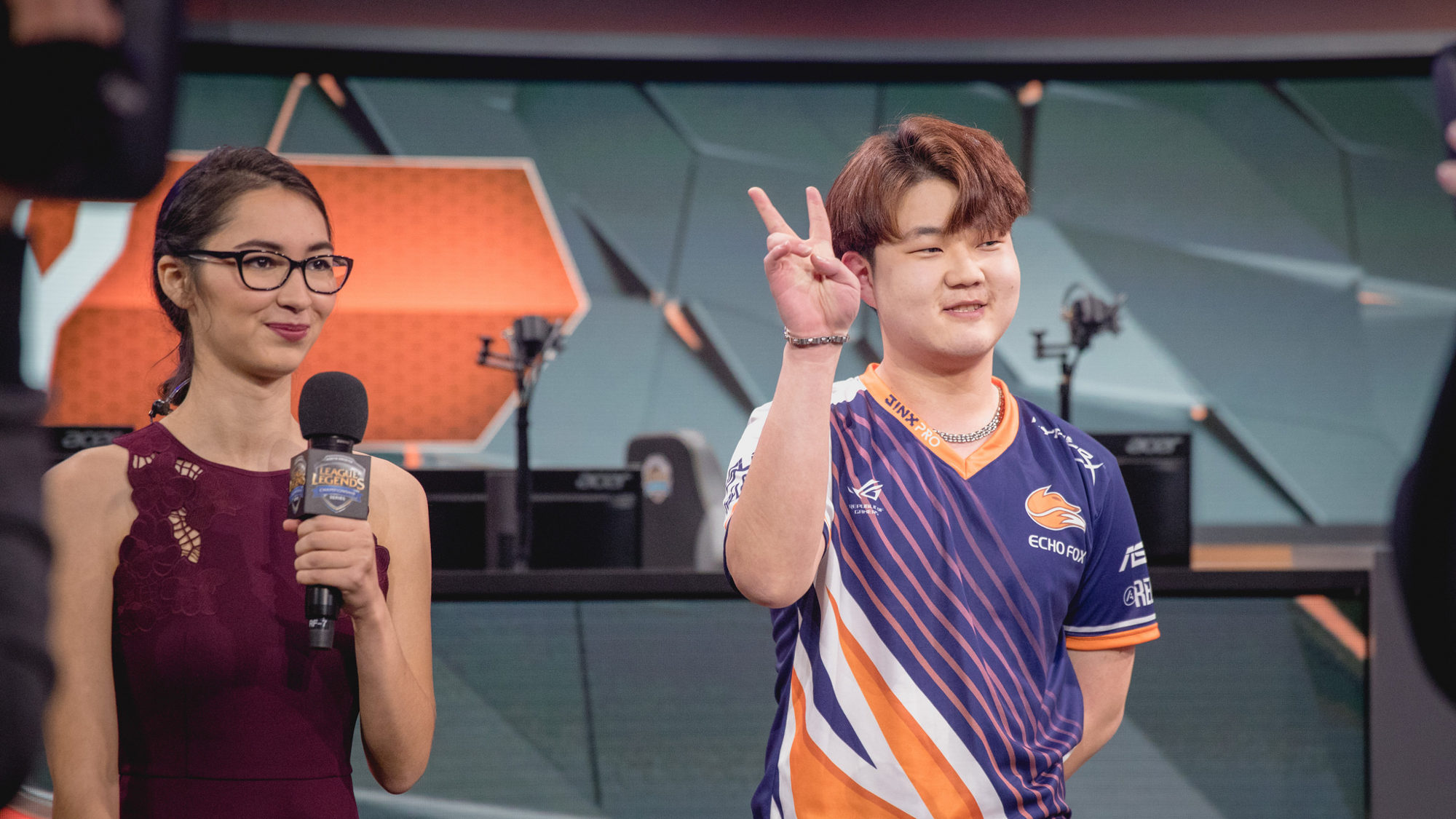 Huni’s funny antics have become as much a trademark on the Echo Fox roster as his no-holds-barred playstyle. (Photo via @lolesports on Flickr.)
Huni’s funny antics have become as much a trademark on the Echo Fox roster as his no-holds-barred playstyle. (Photo via @lolesports on Flickr.)
As General Manager, Jake Fyfe’s job is finding the magic, explosive player combinations no one else considers. Some of Echo Fox’s players have been on more teams in a few years than pro sports players are in their entire careers. Some have also gained reputations for sizeable egos. (In a post-game interview, Josh ‘Dardoch’ Hartnett said, “Everyone says we have strong personalities, but we really just think we’re a little better at the game than everybody else.” Touche, kinda.) These factors might dissuade other esports teams from recruiting them, but not Echo Fox.
A few eyebrows certainly went up when Echo Fox brought in Dardoch, mostly due to his volatile reputation and a colorful team history. Echo Fox wasn’t the only team Dardoch talked to during Free Agency. However, they were the only ones who bothered getting to know him as a person. “We really took a lot of time understanding where Dardoch came from, why he acted the way he does, and who he wants to be,” says GM Jake Fyfe.
It also helps that Dardoch fully owned up to his past mistakes, admitting that he didn’t like the person he once was. “That stood out for us. I mean, that guy has so much potential,” says Fyfe. Plus, Dardoch is just 19. It bothered Fyfe that the community was talking about the Jungler like his career was already over and his personality set in stone. Fyfe strongly believes in second chances and thinks it’s deeply wrong for a player’s behavior from a short period to define them forever. Put the right player in the wrong environment and their performance looks grim. Get them in the right environment and incredible things can happen.
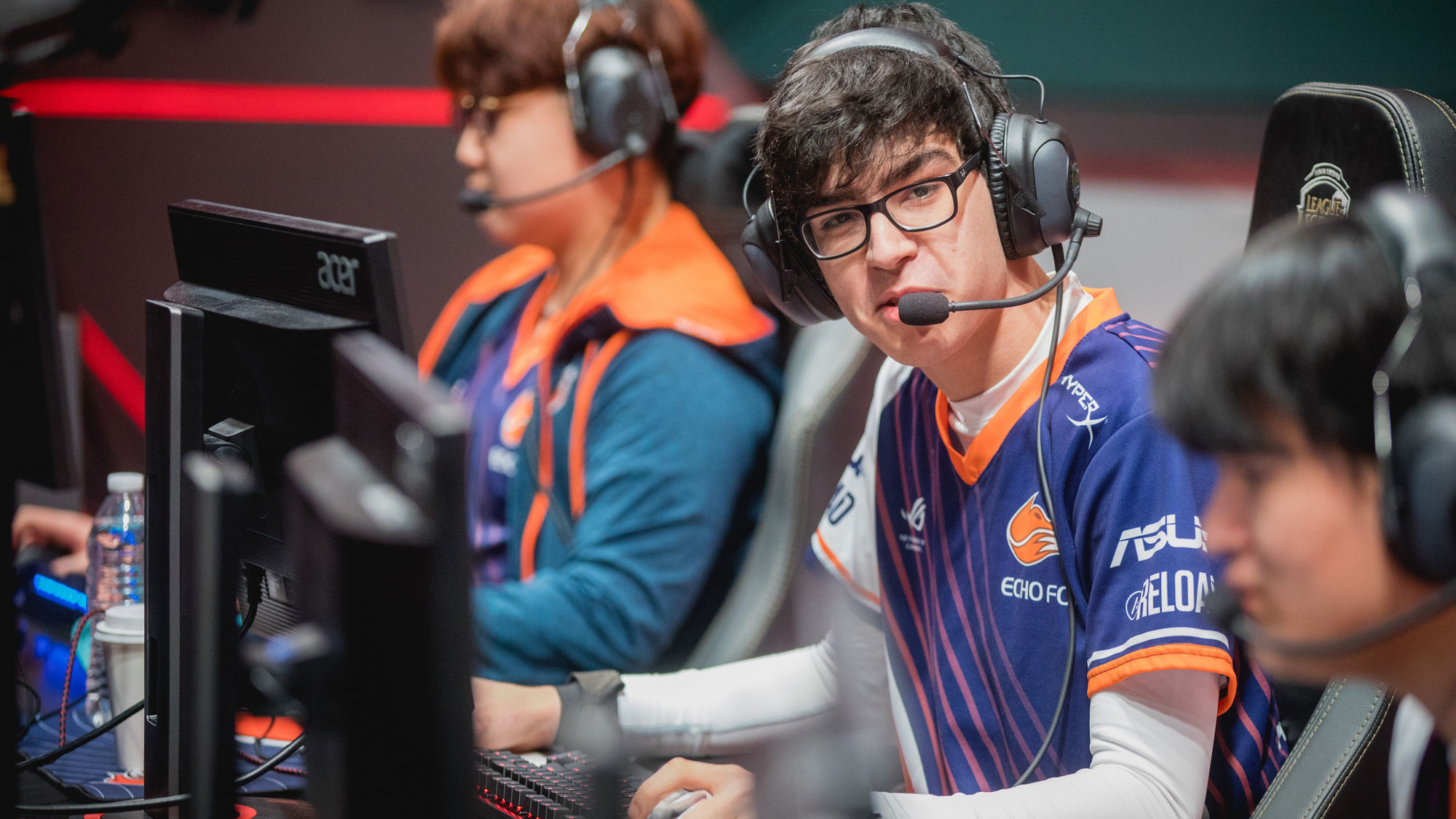 With the right support system, Echo Fox’s GM Jake Fyfe thinks Dardoch (pictured) could easily be one of the best Junglers. (Photo via @lolesports on Flickr.)
With the right support system, Echo Fox’s GM Jake Fyfe thinks Dardoch (pictured) could easily be one of the best Junglers. (Photo via @lolesports on Flickr.)
So, what does Echo Fox’s team management regularly see that everyone else is missing? “We have a really cool synergy between each player,” Fyfe says. Team owner, Rick Fox, has dubbed this phenomenon the “law of thirds”. If just one player has a strong personality, they can dominate the team and blow everything up. If there are two overpowering egos, they clash. If there are three or more, though, it creates a “weird, chaotic balance.” Add in long-time friendships between players, and you get an unbeatable matchup. So far, Fyfe’s secret sauce is working.
If it’s not support, it’s background noise
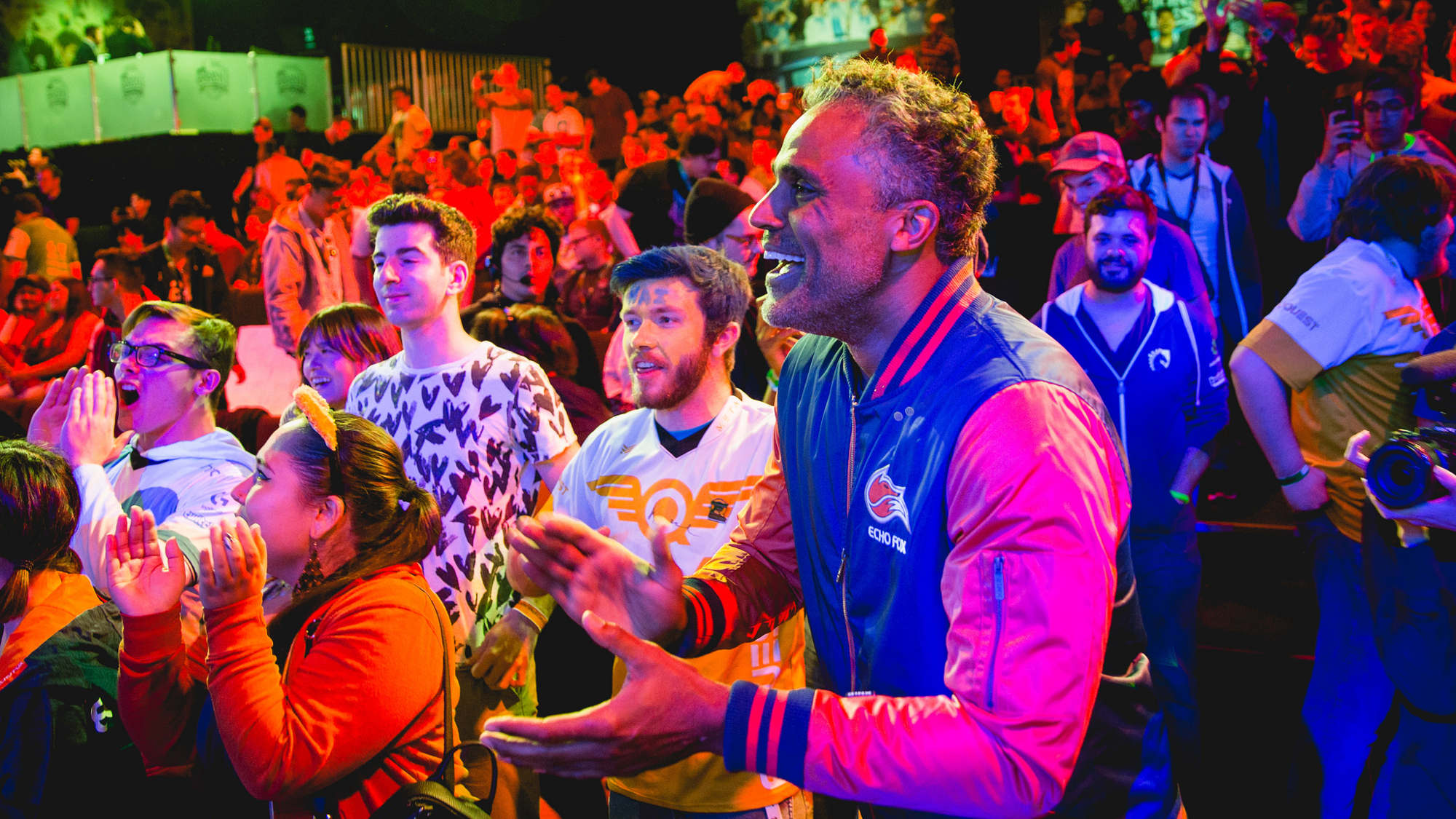 Rick Fox applauds another victorious Echo Fox weekend.
Rick Fox applauds another victorious Echo Fox weekend.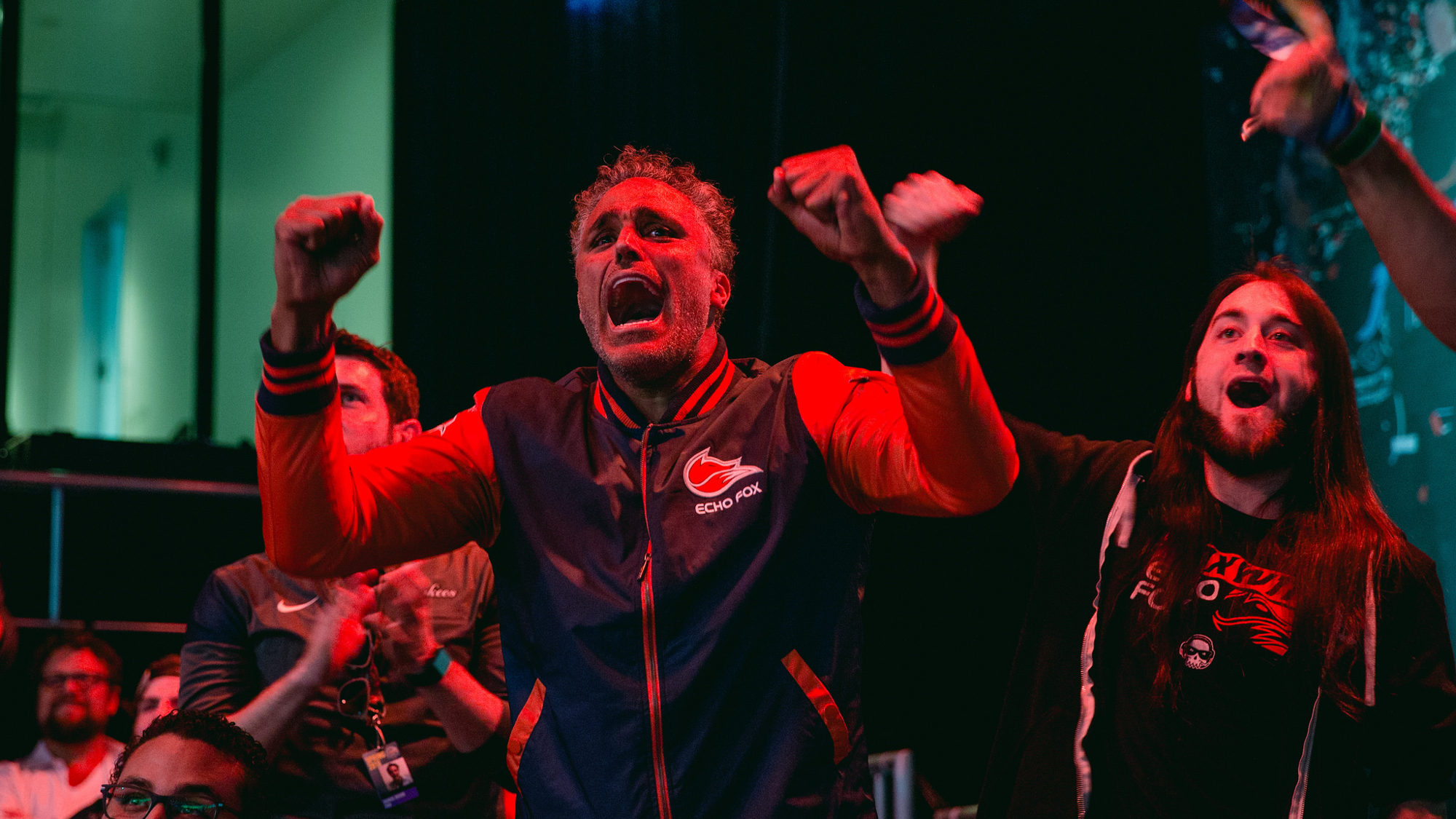 From the look on his face, the team owner might just be Echo Fox’s number one fan. (Photo via @lolesports on Flickr.)
From the look on his face, the team owner might just be Echo Fox’s number one fan. (Photo via @lolesports on Flickr.)
Jared Jeffries leans forward for emphasis: “Our only goal is making them the best players they can be. Everything else, all the background noise, it doesn't matter.” If players improve when they’re on his team, he considers it a success. They’ll do almost anything to make sure that happens.
The ex-NBA player recalls that his best pro basketball years were the ones where his only concern was the game. He wants his gamers to get that same experience. All they should focus on is what they do best, and “as long as they do that, then we’ll support them in any way we can.” Echo Fox has a sports psychologist, trainer, nutritionist, personal chefs, travel agents, office admins, and more. Whether it’s for themselves or their families, they can ask for almost anything they need and get it.
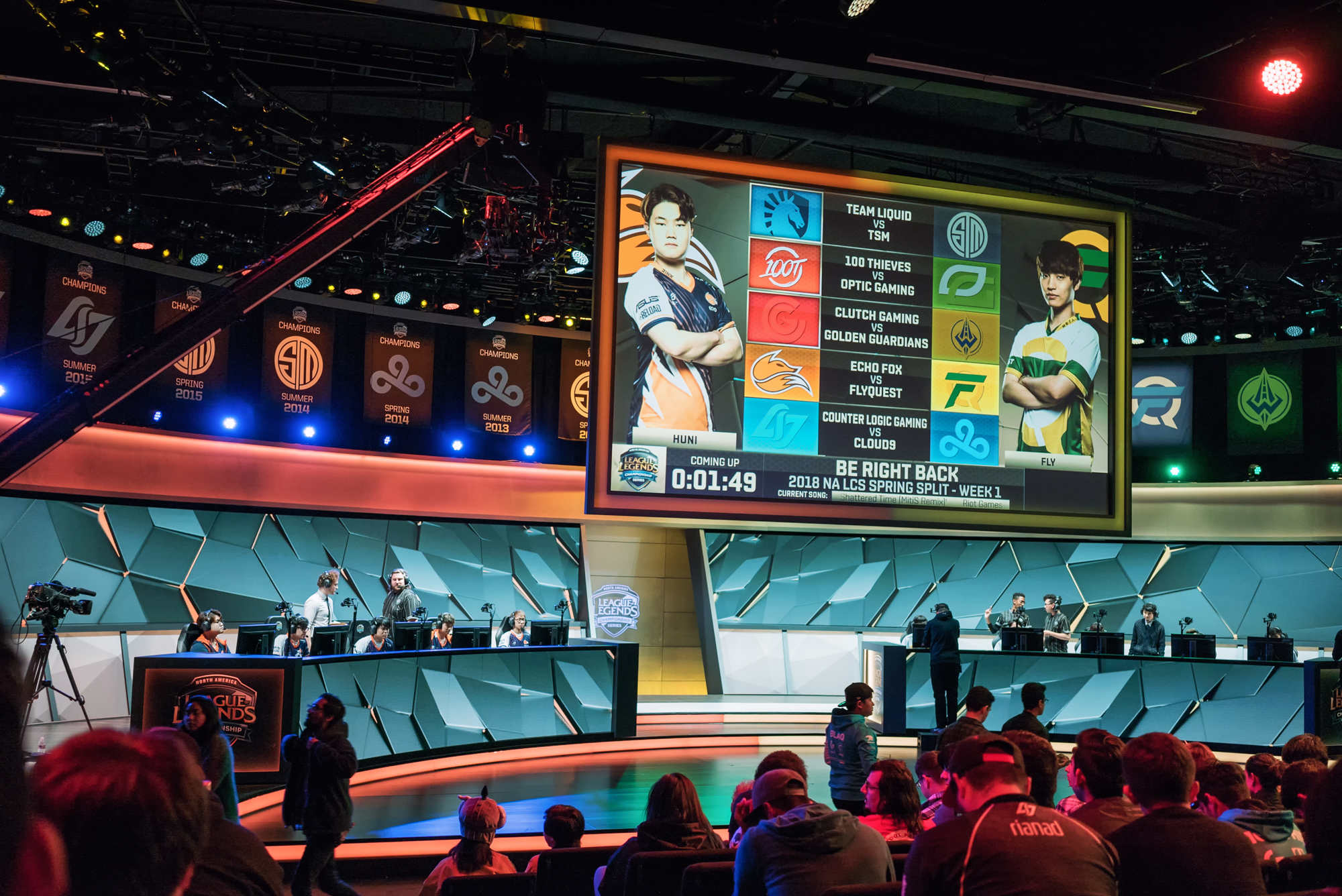 To get the best performance inside the arena, Echo Fox’s management knows they need to provide the best support outside of it.
To get the best performance inside the arena, Echo Fox’s management knows they need to provide the best support outside of it.
Plenty of teams provide material perks and high salaries, but this is where Echo Fox goes above and beyond with infrastructure and player support. Jeffries has become a mentor, or perhaps a father-figure, of sorts. When people tell him there’s a problem player, he takes matters into his own hands. “I'll try to spend a day or two with them to get a chance to talk to them,” he says. Although, he rarely finds they’re truly a problem. Most players are just teens and twenty-somethings with no idea how to deal with newfound fame and fortune. The personalities he sees in esports are nothing like the NBA. “These kids are so much more humble, they're so down to earth,” he says, shaking his head. “They're not problem kids, man.”
Dardoch says he regularly meets with Jeffries to talk about about personal and professional goals. This stunned him, even after years of professional gaming: “No other organization gave me the option of having a conversation about what I wanted in my life.” What seems normal for other professions is surprisingly uncommon in esports, where many organizations are still new and inexperienced. Most don’t have career discussions with players or know how to manage their long-term professional goals.
Long before the rest of the LCS team began apartment-hunting, Dardoch had the freedom to live on his own. It sounds inconsequential, but asking players to live in situations that are a bad personal fit can have a seriously negative ripple effect. Being part of an organization that trusts its players enough to make decisions about where they’re living is actually huge.
.@Dardochlol says that Fox president Jared Jeffries (@ModernFishingTV) helps him grow as a player with "NBA wisdom" pic.twitter.com/VeGyaxbjoh
— Echo Fox (@echofoxgg) January 22, 2018
Dardoch says Jared Jeffries’ mentorship has helped him grow as a player. Via @EchoFoxGG on Twitter.
A virtuous cycle of goodness
Echo Fox may look for players who are good people, but it’s also clear that their players and management asked a similar question: is this a good place to be? Every new player this season signed on because they felt something was fundamentally different about Echo Fox. Leadership sets the tone for organizations. In Echo Fox’s case, management and ownership have created a virtuous cycle, one where players are valued as people, not just power rankings, and give their all to prove this trust isn’t in vain.
In an industry where pro gamers are often exploited, Echo Fox is a heartening and genuine counterexample. Rick Fox, Jared Jeffries, Jake Fyfe, Daniel Deshe, and the entire Echo Fox organization are living proof that, beyond high salaries, valuing, trusting, and supporting players are the real game changers, especially if you’re in the business of training some of the world’s best.
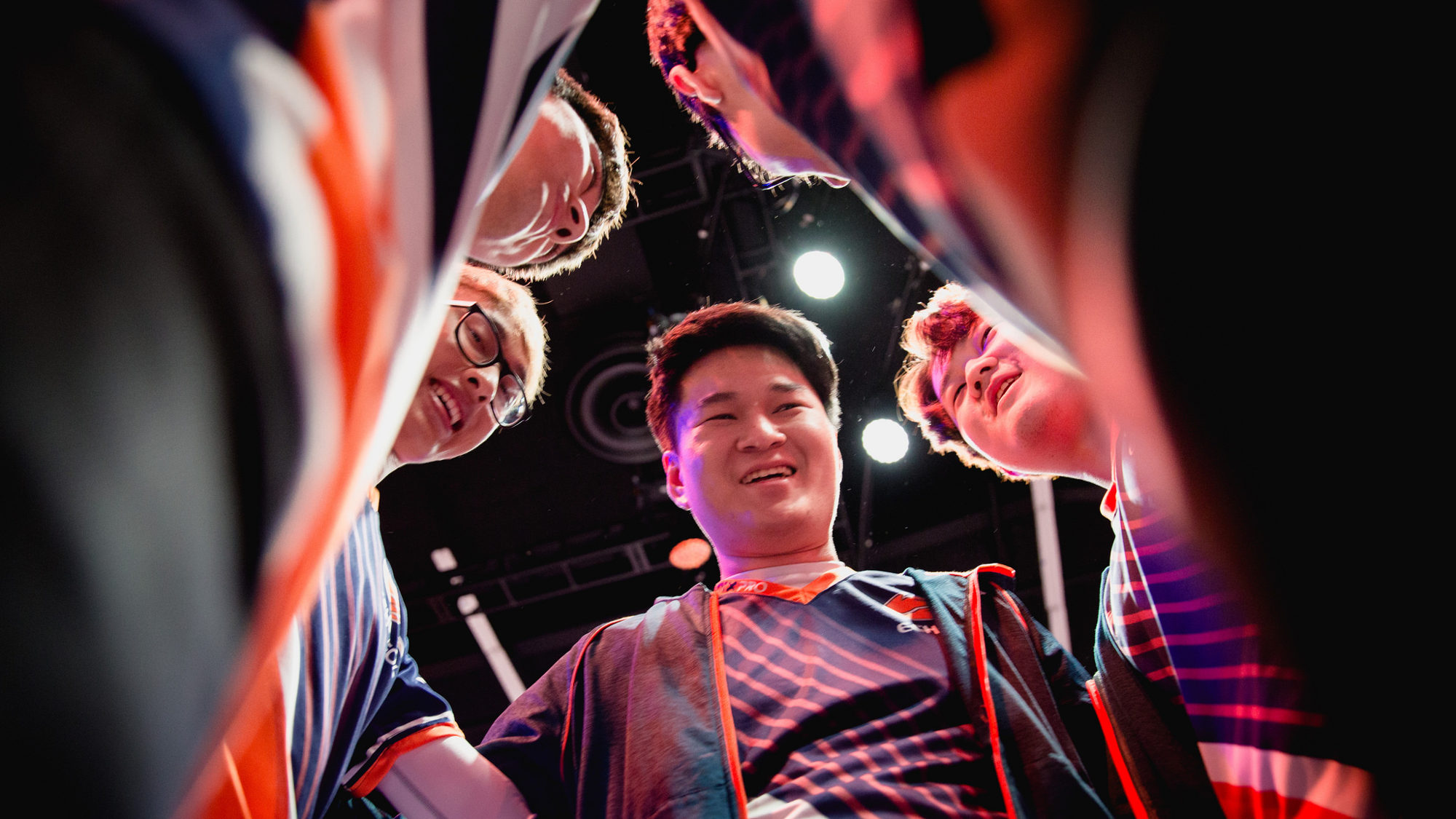 The excited team huddles up before their week two battles. (Photo via @lolesports on Flickr.)
The excited team huddles up before their week two battles. (Photo via @lolesports on Flickr.)
By Kimberly Koenig
Author
Popular Posts
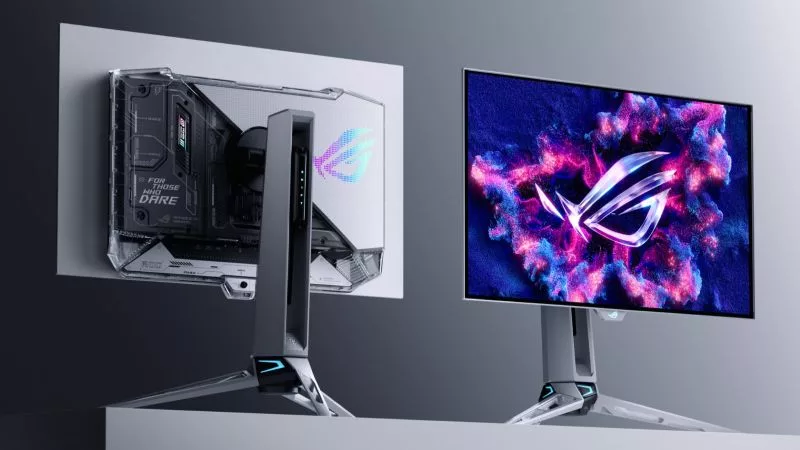
Prepare for Tandem OLED splendor with these new ROG gaming monitors
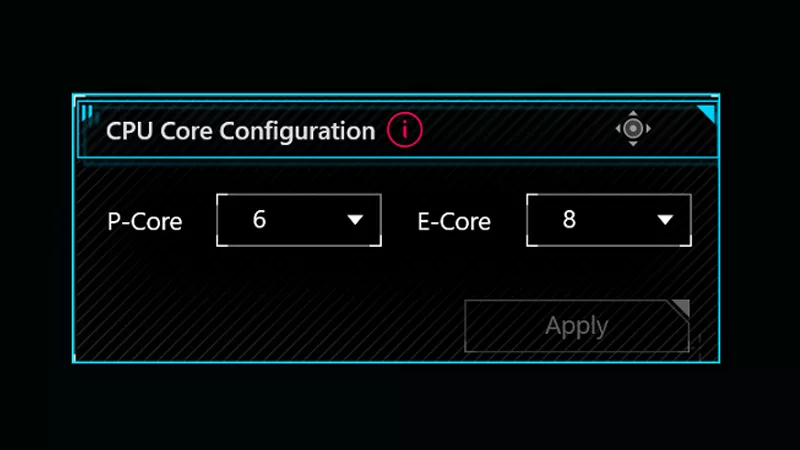
How to adjust your laptop's P-Cores and E-Cores for better performance and battery life
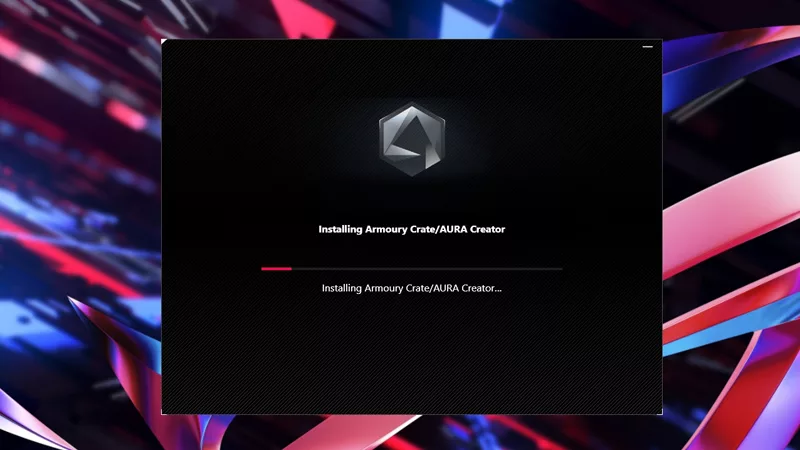
How to Cleanly Uninstall and Reinstall Armoury Crate
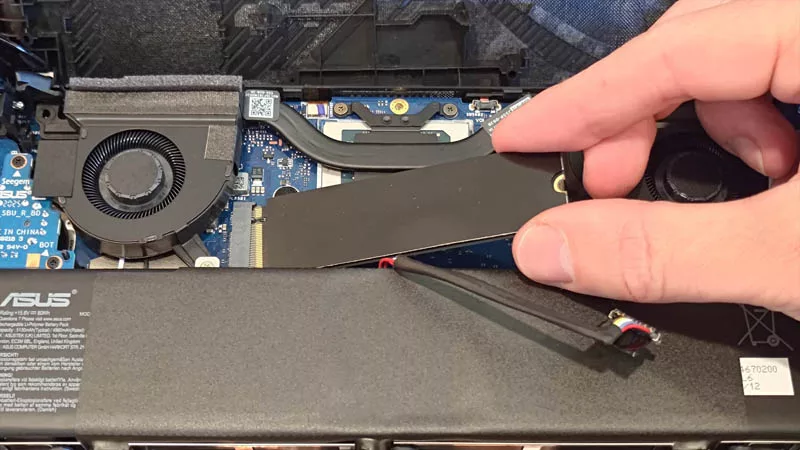
How to upgrade the SSD and reinstall Windows on your ROG Ally, ROG Xbox Ally, or ROG Xbox Ally X
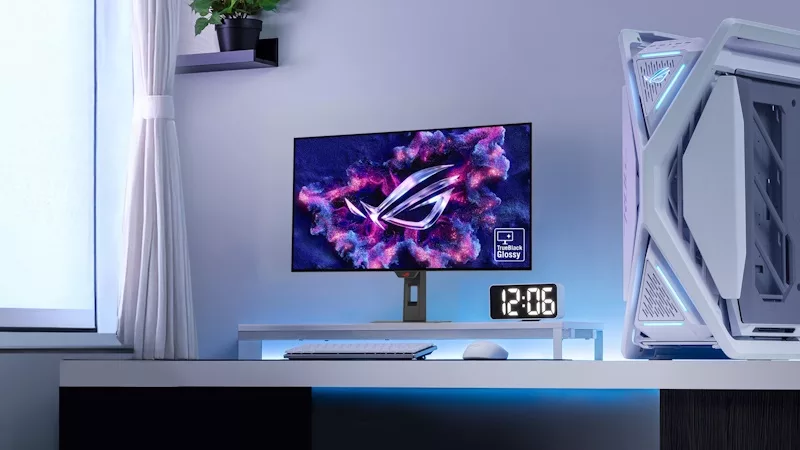
32-inch glossy WOLED panels debut in the ROG Strix OLED XG32UCWMG and XG32UCWG gaming monitors
LATEST ARTICLES
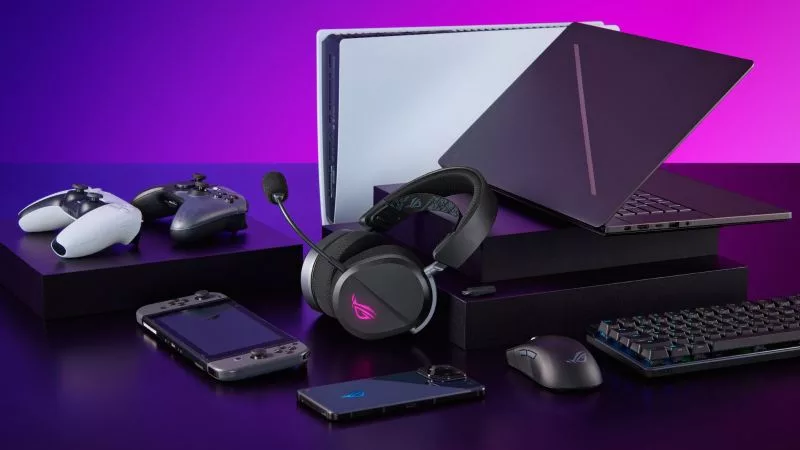
Level up your Xbox, PlayStation, and Nintendo Switch 2 with these ROG accessories
ROG has headsets, controllers, and other gadgets that’ll amp up your console experience, too.
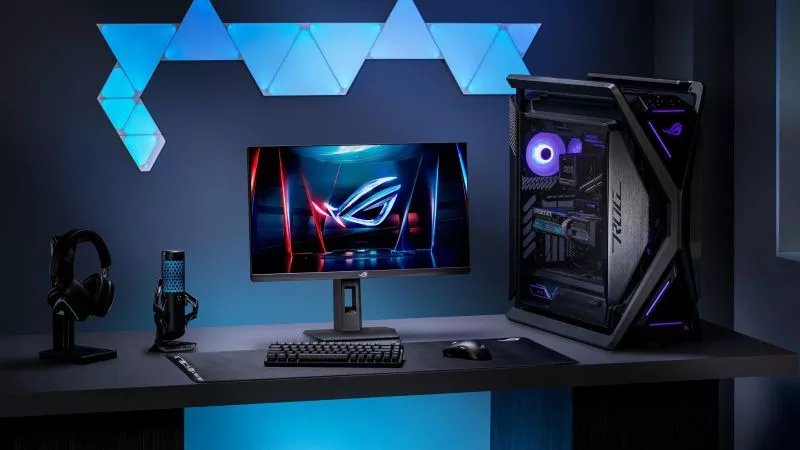
How ROG reinvents the PC gaming platform
Here's why millions choose the Republic of Gamers, ROG, as their defining gaming destination.

The best AAA games for the ROG Ally and ROG Ally X
The ROG Ally is a new breed of handheld, capable of handling large-scale AAA games with great performance. Here are some of our top games for the system.
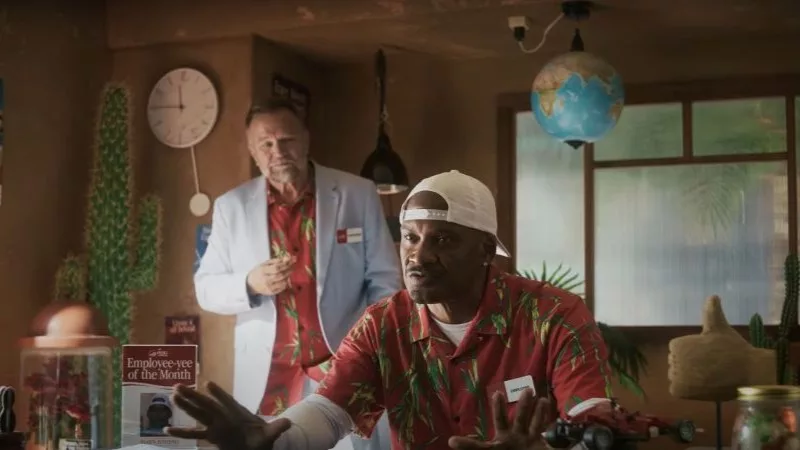
ROG Travel has assembled a legendary cast for its new ROG Xbox Ally video
ROG Travel is back in action with a zany new video to get folks aboard the ROG Xbox Ally hype train.
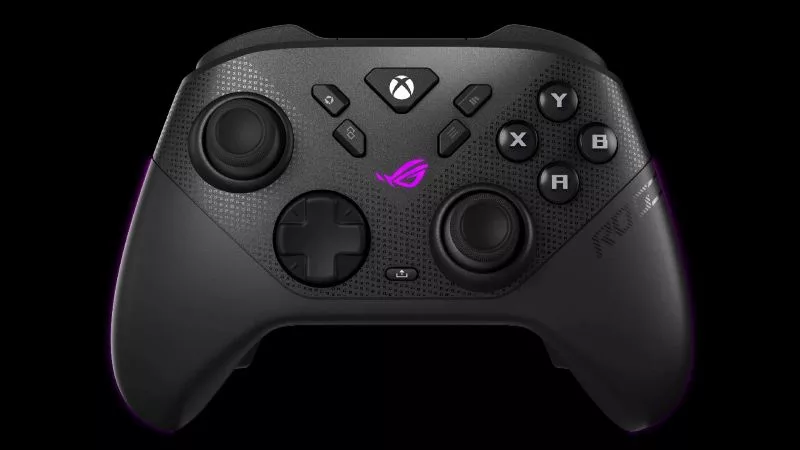
The ROG Raikiri II Xbox Wireless Controller is your next-gen premium gamepad for console and PC
From your desk or your couch, the ROG Raikiri II Xbox Wireless Controller is perfect for your PC, Xbox, or ROG Xbox Ally.
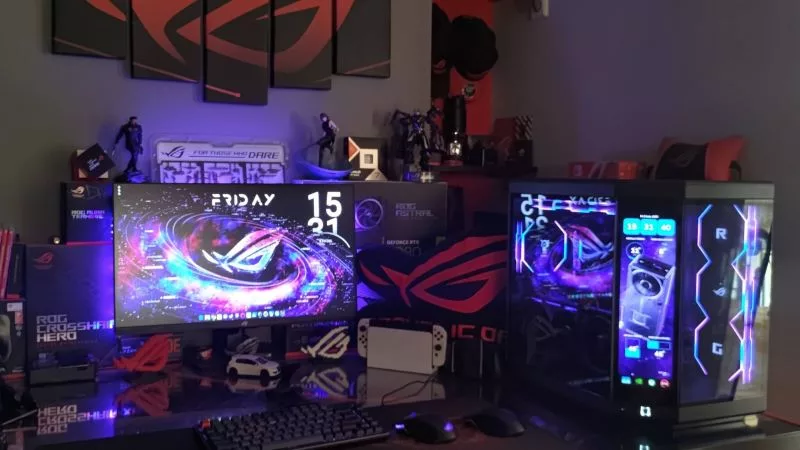
Four slick ROG PC gaming battlestations to model your setup after
Check out some of the coolest gaming PC battlestations assembled by ROG fans.